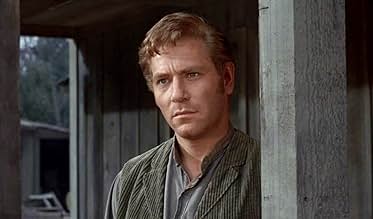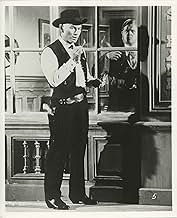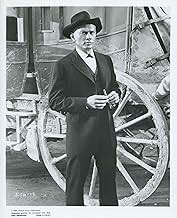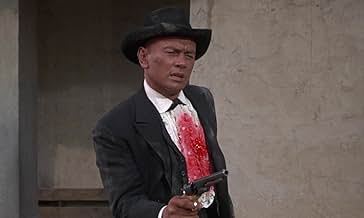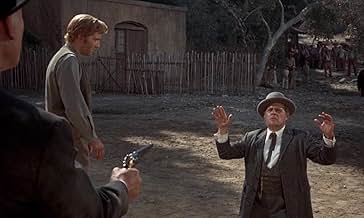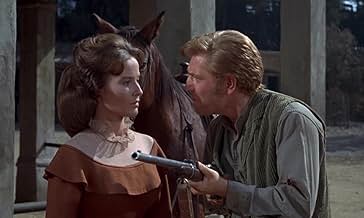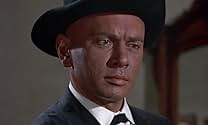In New Mexico, a Confederate veteran returns home to find his fiancée married to a Union soldier, his Yankee neighbors rallied against him and his property sold by the local banker who then ... Read allIn New Mexico, a Confederate veteran returns home to find his fiancée married to a Union soldier, his Yankee neighbors rallied against him and his property sold by the local banker who then hires a gunman to kill him.In New Mexico, a Confederate veteran returns home to find his fiancée married to a Union soldier, his Yankee neighbors rallied against him and his property sold by the local banker who then hires a gunman to kill him.
- Manuel
- (as John Alonzo)
Featured reviews
The acting is all over the board in this one, as well. Brynner's performance can't be faulted; he's his usual simmering, silent presence, but seems miscast in a role which could have been quite interesting if it weren't so poorly-written. Janice Rule seems confused in her role as Ruth Adams (and well she should be, forced to serve as the love interest between--count them--three men, all trying to kill each other at some point or another), and spends most of it looking vaguely sad and disinterested, and Pat Hingle is neither evil enough nor serious enough to make a compelling villain. Clifford David fares better as the perpetually angry Crane, and George Segal, as the unfortunate Matt Weaver, is just about the only member of the cast that seems to have any idea what he's doing. The rest of the townsfolk are a mixture of clichés and stereotypes that make it seem as though Yul Brynner mistakenly wandered onto the set of "Blazing Saddles." Brynner's presence, and the multi-layered, operatic scale of the plot might warrant repeat viewings, and the film should be credited for trying to tackle weighty issues of morality and racism, but ultimately "Gunfighter" misses its mark. The classic mantra in storytelling is "show, don't tell," and this film doesn't do that, rendering what should have been a very good movie into a very mediocre one.
A confederate solider Matt Weaver returns back to his small town after the civil war to find out his home has been sold by the dominating town boss Sam Brewster. Causing a ruckus, Brewster hires the interestingly mysterious gunfighter Jules Gaspard d'Estaing to take care of Brewster; however Jules gets caught up in the devious shades of a town run by corrupt figures.
The way the story pans out is thoughtfully projected and the framework delivers it in an unconventional manner with some psychological interplays. The way the steely protagonist uses the situation to gain what he wants and hand out much needed justice within the shameful town simply holds you there. It's literally chatty, but never does it outstay its welcome. A sternly defined Brynner is outstanding (as the camera magnetically follows him around) and likewise is a booming Hingle. When the action/shoot outs occur they're rather sparse, but toughly staged despite its obvious studio bound sets.
AS the movie progresses it's slowly revealed that the Union leaning town is not what it seems to be. Pat Hingle plays a politician very common for 30 years after the Civil War, adept at what they called "waving the bloody shirt." Just demagogue away at who did what and where during the war and ignore the current issues both social and economic.
During the course of The Magnificent Seven, Yul Brynner's Chris Adams is referred to as a Cajun. Here he's given a proper Cajun name of Jules D'Estaing and when his secret is revealed, a whole lot of people in that town have to confront their own prejudices.
Makes for worthwhile viewing.
Yul Brynner was a smoker, and the cigar is ever present. I met him in 1972 out in Malibu, and I asked him if he could quit smoking for his health's sake. He said, "Nope. Too hooked." He was, and sadly for his fans, it was his undoing. He signed a photo for me for my birthday that year, which I still cherish. The world lost a great actor when he passed. He was the best in a Western, wearing black and walking that walk...a man of few words.
Did you know
- TriviaThe Psychose (1960) house set on the Universal back lot was the home for the character "Sam Brewster".
- GoofsOne of the Union infantry veterans in the town wears crossed rifles on his kepi. But the cross rifles insignia was not adopted for infantry until after the Civil War. The crossed rifles are what infantry wore during the post Civil War Indian wars. Rather, infantry wore a bugle on their kepis or bummers cap, and as the year is 1865 and as this is a Union infantry veteran from the Civil War, he should be wearing the bugle insignia and not the crossed rifles insignia.
- Quotes
Sam Brewster: Is your name Jewel?
Hotel Owner: The hotel register....
Jules Gaspard d'Estaing: My name is
[d'Estaing writes his name on a blackboard]
Sam Brewster: Jewels...Gasperd...Die-es-ting
Jules Gaspard d'Estaing: Jules...soft j, silent s...Gaspard...silent d...d'Estaing...just a touch of dipthong.
- Crazy creditsOpening credits prologue: NEW MEXICO TERRITORY - 1865
- ConnectionsReferenced in Question d'honneur (1966)
- How long is Invitation to a Gunfighter?Powered by Alexa
Details
Box office
- Budget
- $1,800,000 (estimated)


